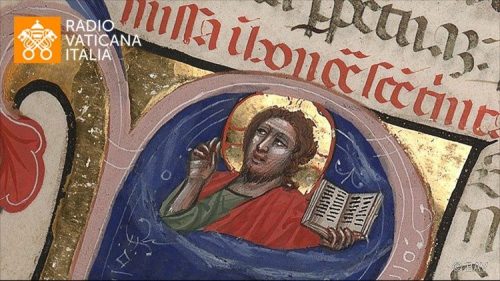READING OF THE DAY
Frist Reading from the Book of the Prophet Isaiah
IS 62:1-5
For Zion’s sake I will not be silent,
for Jerusalem’s sake I will not be quiet,
until her vindication shines forth like the dawn
and her victory like a burning torch.
Nations shall behold your vindication,
and all the kings your glory;
you shall be called by a new name
pronounced by the mouth of the LORD.
You shall be a glorious crown in the hand of the LORD,
a royal diadem held by your God.
No more shall people call you “Forsaken, ”
or your land “Desolate, ”
but you shall be called “My Delight, ”
and your land “Espoused.”
For the LORD delights in you
and makes your land his spouse.
As a young man marries a virgin,
your Builder shall marry you;
and as a bridegroom rejoices in his bride
so shall your God rejoice in you.
Second Reading from the First Letter of Paul to the Corinthians
1 COR 12:4-11
Brothers and sisters:
There are different kinds of spiritual gifts but the same Spirit;
there are different forms of service but the same Lord;
there are different workings but the same God
who produces all of them in everyone.
To each individual the manifestation of the Spirit
is given for some benefit.
To one is given through the Spirit the expression of wisdom;
to another, the expression of knowledge according to the
same Spirit;
to another, faith by the same Spirit;
to another, gifts of healing by the one Spirit;
to another, mighty deeds;
to another, prophecy;
to another, discernment of spirits;
to another, varieties of tongues;
to another, interpretation of tongues.
But one and the same Spirit produces all of these,
distributing them individually to each person as he wishes.
GOSPEL OF THE DAY
From the Gospel according to John
JN 2:1-11
There was a wedding at Cana in Galilee,
and the mother of Jesus was there.
Jesus and his disciples were also invited to the wedding.
When the wine ran short,
the mother of Jesus said to him,
“They have no wine.”
And Jesus said to her,
“Woman, how does your concern affect me?
My hour has not yet come.”
His mother said to the servers,
“Do whatever he tells you.”
Now there were six stone water jars there for Jewish ceremonial washings,
each holding twenty to thirty gallons.
Jesus told the them,
“Fill the jars with water.”
So they filled them to the brim.
Then he told them,
“Draw some out now and take it to the headwaiter.”
So they took it.
And when the headwaiter tasted the water that had become wine,
without knowing where it came from
— although the servers who had drawn the water knew —,
the headwaiter called the bridegroom and said to him,
“Everyone serves good wine first,
and then when people have drunk freely, an inferior one;
but you have kept the good wine until now.”
Jesus did this as the beginning of his signs at Cana in Galilee
and so revealed his glory,
and his disciples began to believe in him.
WORDS OF THE HOLY FATHER
Dear Brothers and Sisters, Good Morning!
[…] today we shall ponder on Jesus’ first miracle, which John the Evangelist calls “signs”, because Jesus doesn’t perform them in order to excite wonder but to reveal the love of the Father. The first of these miraculous signs is actually recounted by John (2:1-11) and takes places at Cana in Galilee. It is a kind of “gateway”, on which are engraved the words and expressions that illuminate the entire mystery of Christ and open the hearts of the disciples to the faith. Let us look at a few of them.
In the introduction we find the expression “Jesus with his disciples” (v. 2). Those whom Jesus called had to follow him, he bound to himself in a community and now, like a single family, they are all invited to a wedding. Thereby initiating his public ministry at the wedding at Cana, Jesus reveals himself as the spouse of the People of God, proclaimed by the prophets, and reveals to us the depth of the relationship that unites us to Him: it is the new Covenant of love. What is at the foundation of our faith? An act of mercy by which Jesus binds us to him. And the Christian life is the response to this love, it is like the history of two people in love. God and man meet, seek, find, celebrate and love one another: just like the lovers in the Song of Songs. Everything else comes as a result of this relationship. The Church is the family of Jesus into which he pours his love; it is this love that the Church safeguards and desires to give to all.
In the context of the Covenant, we are also to understand Our Lady’s observation: “They have no wine” (v. 3). How can one celebrate a wedding feast and make merry without what the prophets indicated as a typical element of the messianic banquet (cf. Am 9:13-14; Jl 2:24; Is 25:6)? Water is necessary for life, but wine expresses the abundance of a banquet and the joy of a feast. This wedding feast was short of wine; the newlyweds are ashamed of this. But just imagine ending a wedding feast drinking tea; it would be a shame. Wine is necessary for a feast. By transforming into wine the water of the jars used “for the Jewish rites of purification” (Jn 2:6), Jesus preforms an eloquent sign: he transforms the Law of Moses into the Gospel, bearer of joy. As John states elsewhere: “For the law was given through Moses; grace and truth came through Jesus Christ” (1:17).
The words Mary addresses to the servants come to crown the wedding of Cana: “Do whatever he tells you” (v. 5). It is curious: these are her last words recounted by the Gospels: they are the legacy that she hands down to us. Today too Our Lady says to us all: “Whatever he tells you — Jesus tells you, do it”. It is the legacy that she has left us: it is beautiful! It is an expression that recalls the formula of faith used by the people of Israel at Sinai in response to the promises of the Covenant: “All that the Lord has spoken we will do!” (Ex 19:8). And indeed at Cana the servants obey. “Jesus said to them, ‘Fill the jars with water’. And they filled them up to the brim. He said to them, ‘Now draw some out, and take it to the steward of the feast’. So they took it” (Jn 2:7-8). At this wedding, the New Covenant is truly articulated and to the servants of the Lord, that is to all the Church, is entrusted a new mission: “Do whatever he tells you!”. To serve the Lord means to listen and to put into practice his Word. It is the simple but essential recommendation of the Mother of Jesus and it is the programme of life of the Christian. For each one of us, to draw from the jar is equivalent to entrusting oneself to the Word of God in order to experience its effectiveness in life. Thus, together with the steward of the banquet who had tasted the water-become-wine, we too can exclaim: “you have kept the good wine until now” (v. 10). Yes, the Lord continues to reserve the best wine for our salvation, just as it continues to flow from the pierced side of the Lord.
The conclusion of the narrative sounds like a judgment: “This, the first of his signs, Jesus did at Cana in Galilee, and manifested his glory; and his disciples believed in him” (v. 11). The wedding feast at Cana is more than a simple account of Jesus’ first miracle. Like a treasure chest, He guards the secret of his Person and the purpose of his coming: the awaited Groom starts off the wedding that is fulfilled in the Paschal Mystery. At this wedding Jesus binds his disciples to himself in a new and final Covenant. At Cana Jesus’ disciples become his family and at Cana the faith of the Church is born. We are all invited to the wedding feast, because the new wine will never run short!
(General Audience, 8 June 2016)

